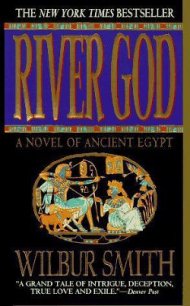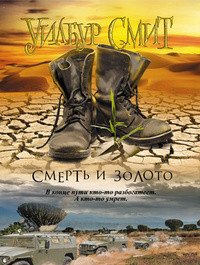Men of Men - Smith Wilbur (книги бесплатно без txt) 📗
A With a stoop of his spirits, Ralph thought for a moment that someone else had forestalled him. According to Zouga, the stone falcons should have been here in this courtyard, and he started forward, his superstitious chills forgotten in the bleaker fear of having -been deprived of his booty.
He plunged into the waist-high undergrowth and waded through it towards the tower, and he tripped over the first of the statues, and almost fell. He crouched over it and with his hands tore away the tangle that covered it, and then he looked into the blank cruel eyes above the curved beak that he remembered so well from his childhood. It was the identical twin of the statue that had stood on the verandah of Zouga's cottage at Kimberley, but this falcon had been cast down and lay half buried by roots and brush.
He ran his hands over the satiny green soapstone, then with one finger traced the well-remembered shark'stooth pattern around the plinth.
"We've come for you at last," he whispered aloud, and then looked around him quickly. His voice had echoed eerily against the surrounding walls, and he shivered though the sun was still high. Then he stood up and went on searching.
There were six statues, as Zouga had counted them.
One was shattered as though by the blows from a sledgehammer, the battered head lay beside it. Three others were damaged to a lesser extent, but the remaining two statues were perfect.
"This is an evil place," a sepulchral voice intoned unexpectedly, and Ralph started and spun to face it.
Isazi had followed and stood close behind him, preferring the terrors of the narrow passages and ominous walls to the greater terror of remaining alone at the gateway to the city.
"When can we leave here, Nkosi?" Isazi shot restless little glances into the dismal corners of tumbled passageways. "It is not a place where a man should stay overlong."
"How soon can we load these onto the oxen?" Ralph squatted and patted one of the fallen images. "Can we do it before nightfall?"
"Yebho, Nkosi." Isazi promised fervently. "By nightfall we will be a good march away from here. You have my word upon it."
The king had once again chosen Bazo for a special task and Bazo's heart was big with pride as he led the vanguard of his impi along the secret road that took them deeper and deeper into the dreaming Hills of the Matopos.
The road was well beaten, wide enough for two warriors to run abreast with their shields just touching, for it had been used since the time when Mzilikazi, the old king, had first brought the nation up from the south.
Mzilikazi himself had blazed the trail to the secret cavern of the Umlimo. At every crisis in the nation's history, the old king had followed this road, in drought or pestilence or plague, he had come to hear the words of the chosen one. Every season he had come for advice on the herds and the crops, or to help him decide in which direction to send his raiding impis.
Lobengula, himself an initiate of the lesser mysteries, had first entered the cavern of the Umlimo as a youth led by the crazed old magician who had been his mentor and his tutor. It had been the Umlimo's word which had placed the toy spear of kingship in Lobengula's hand when Mzilikazi had let it fall from his grasp. It was the Umlimo who had chosen Lobengula in preference to Nkulumane or the other older brothers of nobler birth and it was the Umlimo who had made him the favourite of the ancestral spirits and had sustained him in the darkest hours of his reign.
Thus it was that Lobengula, plagued by the importunate demands of the emissaries of a white man whom he had never seen, confused by scraps of paper whose signs he could not read, troubled by doubts and tormented by fears, badgered and pulled by the conflicting advice of his senior indunas, was at last returning to the secret cavern.
He lay on his litter, on a mattress of the soft yellow and black spotted furs of the leopard, rocked by the motion of the trotting bearers, so that the naked folds and bulges of his gross black body shook and rippled, and he looked ahead with dark and haunted eyes.
Lodzi, that was the name on every white man's lips.
Everywhere he turned, Lobengula heard the name Lodzi.
"Is this Lodzi a king, as I am a king?" he had asked the white man with the red face; for Lobengula, as a Matabele, could not pronounce the "R" of the name.
"mister Rhodes is not a king, yet he is greater than a king," Rudd had said.
"Why does not Lodzi come to me himself?"
Rhodes has gone across the sea, he sends us lesser men to do this business."
"If I could look upon the face of Lodzi, then I would know if his heart was great."
But Rhodes would not come, and day after day Lobengula had listened to the insistence of Lodzi's minions, and in the nights his indunas cautioned and questioned him, and argued amongst themselves.
"If you give the white men a finger, they want the hand," Gandang told him, "and having the hand, they desire the arm and then the chest and the heart and the head."
"Oh King, Lodzi is a man of pride and honour. His word is like Lobengula's own. He is a good man," said Nomusa, whom he trusted as he trusted few others.
"Give each of the white men a little, and give the same thing to each of them," counselled Kamuza, one of his youngest but most cunning indunas, a man who had lived with the white men and knew their ways. "Thus white man becomes the enemy of the other. Set every one dog on the other, lest the pack set upon you."
"Choose the strongest of the white men and make him our ally" said Somabula. "This Lodzi is the herd bull.
Choose him."
And Lobengula had cocked his ear to each of them in turn, and become more desperate and more confused with every conflicting view, until now there was only one path open to him, the path into the Matopos.
Behind his litter came the bearers with the gifts for the oracle, rolls of copper wire, leather bags of coarse salt, pots of trade beads, six great tusks of yellow ivory, bolts of bright cloth, knives made by his master smith with handles of rhinoceros horn, a considerable treasure to pay for the words which he hoped would give him solace.
The path twisted down like a maimed serpent into the gut of the hills, so that the sun was lost and there was only a narrow strip of blue sky showing between the tops of the granite cliffs.
The rank and thorny vegetation crowded the pathway and at last met overhead, forming a dreary tunnel, and the silence was a heavy oppressive presence, for no bird sang and no animal squeaked or scurried in the undergrowth.
But Bazo led on at the same pace, his head swinging from side to side, scanning for danger or menace, and his grip on the shaft of his stabbing spear was firm, his sweat-oiled muscles tense as the springs of a mantrap, ready to hurl his body forward to meet an enemy at any twist in the path.
There was a stream of slow green water and algae-slick boulders across the track, and Bazo leapt it easily with barely a break in his stride; and fifty paces farther on the bush thinned and the cliffs pinched in to form a natural gateway of stone that led into the looming precipice.
Here a determined spearman could hold a thousand and Bazo surveyed it with the swift appraisal of a soldier; and then he raised his gaze to the ledge high above on which was perched a small thatched watch-hut.
Bazo grounded the butt of his long red shield, and called up the cliff. "I, Bazo, induna of one thousand, demand passage." His voice boomed and broke into a myriad echoes against the stone walls.
in whose name do you come to trouble the spirits of the air and earth?" a querulous old man's voice replied, and a sticklike figure, foreshortened by the height of the cliff, appeared upon the lip.




